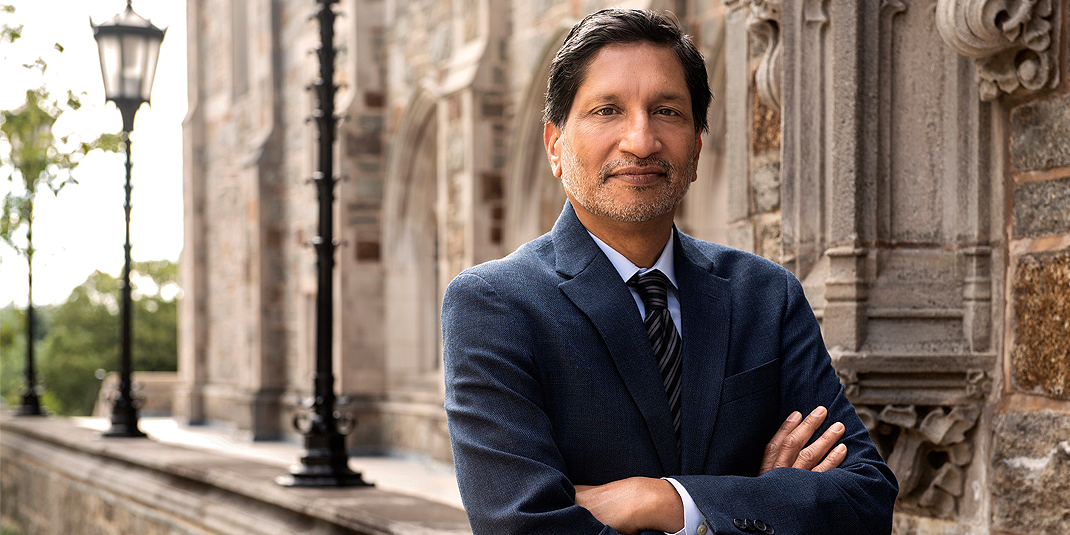Photo by Chris Soldt
The water crisis in Flint, Mich., has been cited as a failure of local, state and federal authorities to protect the public good. Boston College School of Social Work Dean Gautam Yadama says the Flint saga represents the daily plight faced by many people around the world who lack regular access to clean water.
“There were problems in the authorities’ oversight of the quality of Flint’s water system,” Yadama explains, “and Flint’s residents could hold accountable those authorities in which they placed their trust. Once there was evidence of a crisis, the city, state and EPA sprang into action to deliver better water and assess the problems. A recent study showed significant improvement in Flint’s water quality, which suggests the intervention had an impact.
“People in lower-income, resource-poor areas of the world have little, if any, means to protect the quality of their water supply, let alone any supply. In many rural communities, there is no authority to implement or enforce regulations to safeguard quality, no industry to provide maintenance of the system, no trained professionals to gauge the impacts of water use. This has tremendous far-reaching consequences.”
In such communities, the solution is to design strong social organizations to oversee both the supply and quality of the water, says Yadama – and he is part of an innovative initiative aiming to do precisely that.
Yadama is among a group of experts convened by Indian think tank Center for Economic and Social Studies to advise on an impact study of Mission Bhagiratha, a program with a goal to provide treated drinking water to more than 24,000 habitations – the equivalent of approximately 4,919,007 rural households – in India’s southern state of Telangana. The project is in its initial implementation phase.
According to Yadama, there are two central questions to this program. First is whether Mission Bhagiratha can fulfill the task of supplying clean drinking water to all the habitations: Rather than piping it directly to each household in a community, water will made available to the residents via a central source.
“The second question is, how do we ensure that there is adequate water being supplied and if it is clean and safe?” says Yadama, who became BCSSW dean last summer. “In Flint and across the US, there are regulatory bodies and offices charged with continuous monitoring of the supply and quality of water. In the case of rural Telangana, we have to focus on empowering communities and strengthening local institutions, so that members of each community are able to oversee the operation and upkeep of the water system, as well as monitor whether the water meets standards for healthy consumption.
“If a key resource – like water – is a shared one, then communities have to be mobilized to govern water as a shared resource. In the absence of a local or state authority, the physical investments to provide critical services must be maintained by social or civic organizations. This study will offer evidence and a guideline for preparing communities to be these front-line institutions.”
A dean of a social work school might seem an unlikely choice to aid a clean-water project, but the Mission Bhagiratha study dovetails with Yadama’s interdisciplinary research on how communities self-govern and collectively provide essential public goods and vital common-pool resources for their livelihoods, and how such enterprises can be supported by government and non-governmental organizations that engage and collaborate with these communities.
For Yadama – who has studied the social and environmental challenges of the rural poor in South Asia and China – these social and ecological interactions influence the sustained implementation of household and community interventions to overcome social dilemmas and improve wellbeing.
“If a key resource – like water – is a shared one, then communities have to be mobilized to govern water as a shared resource. In the absence of a local or state authority, the physical investments to provide critical services must be maintained by social or civic organizations."
“One question is, can we glean something from these processes that can be used elsewhere?” he says. “Providing robust information on social and community organizations is a key component of social work. But there also is a great opportunity in these sustainable interventions for other disciplines, such as environmental science, biology and public health: Studies show that the work done on improving nutritional outcomes in resource-poor areas is undermined by water and sanitation issues, which are environmental. So having different kinds of expertise involved can only increase the effectiveness of programs like Mission Bhagiratha.”
Yadama hopes to interest other BC researchers in taking part in the study, and believes there can also be roles for graduate and undergraduate students – for example, utilizing skills in GIS (geographic information systems) to look for patterns across habitations in water supply and quality that could help in fine-tuning the project.
“BC’s mission is to train students to address the great issues confronting humanity, especially those in need,” he says. “We want them to have a front-row seat to examine complex problems and the challenges of intervention, and to be meaningfully engaged.”
Boston College and other universities “belong to a very special class of institutions,” Yadama adds. “They are centers of learning, knowledge and contemplation, but are increasingly called upon to leverage their resources to intervene in urgent matters of human concern. Today’s most pressing challenges are at the intersections of poverty, environment, population wellbeing, health, and sustainable development.
“If universities are to matter for our societies, then we must generate systematic knowledge that matters to the most vulnerable in our midst. We have to put equal emphasis on translation of knowledge for societal impact.”
-Sean Smith / University Communications




